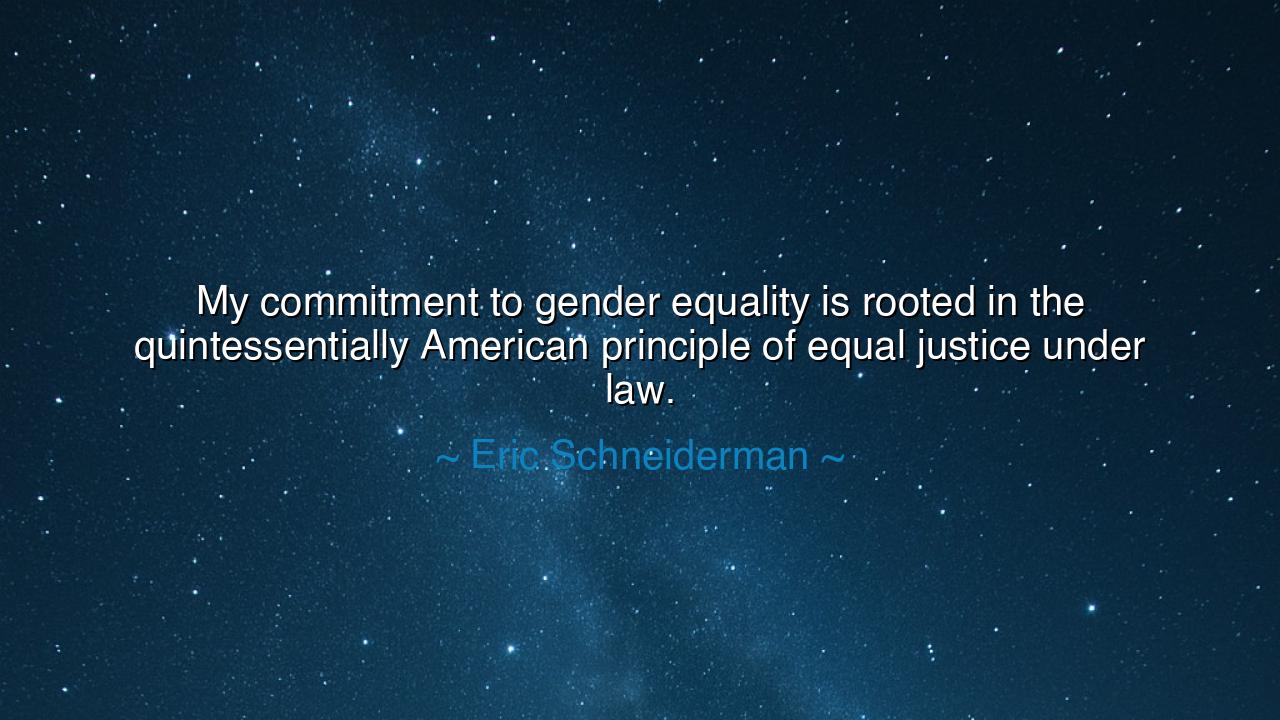
My commitment to gender equality is rooted in the
My commitment to gender equality is rooted in the quintessentially American principle of equal justice under law.






“My commitment to gender equality is rooted in the quintessentially American principle of equal justice under law.” — Eric Schneiderman
In this solemn declaration, Eric Schneiderman invokes one of the most enduring ideals of the American republic — the principle of equal justice under law. His words carry not the tone of novelty, but of remembrance, as if calling a nation back to its founding promise. He reminds us that gender equality is not a gift to be granted, nor a trend to be followed, but a moral duty already woven into the very fabric of American justice. To seek equality for women, he declares, is not to demand something new, but to fulfill something ancient — a truth written not only in the Constitution, but in the conscience of humankind.
The phrase “equal justice under law” stands engraved upon the marble of the United States Supreme Court, like an oath carved in stone. It descends from the wisdom of ages — from the lawgivers of ancient Greece, the prophets of Israel, and the framers of the American experiment. It affirms that the law, to be just, must serve not power but principle; not privilege but personhood. Schneiderman’s reflection roots gender equality in this sacred tradition, teaching that the fight for women’s rights is not a separate struggle, but the very continuation of the great American story — the ongoing effort to make freedom real for all.
From the earliest days of the republic, the dream of equality was proclaimed, yet imperfectly lived. When the Founders wrote of liberty, many were still bound; when they spoke of justice, many were still denied it. And so, generation after generation, voices rose to claim the unfinished work of freedom. Among them were the daughters of America — Elizabeth Cady Stanton, Sojourner Truth, and Susan B. Anthony — who stood before crowds and courts alike, proclaiming that the principle of equal justice could not be true while half of humanity was silenced. Their courage, like a flame passed from one era to the next, illuminated the path that Schneiderman now references: the path from the promise of equality to its fulfillment in practice.
To be “committed to gender equality” is thus to be committed to justice itself — to the idea that no person should be judged or constrained by what they were born as, but only by what they choose to do. It is to understand that discrimination against women, in any form, weakens the very structure of democracy. For a nation that denies equality to one gender cannot claim to honor liberty for any. Schneiderman’s statement, though spoken in a modern voice, resonates with the cadence of the ancients: it is a call to restore harmony to the order of human affairs, to align law with truth, and truth with compassion.
History itself bears witness to this principle. Consider the transformation wrought by the Civil Rights Movement, when citizens of courage stood against injustice and reminded the world that the Constitution’s promise belonged to all. The struggle for gender equality follows the same sacred lineage. Just as Martin Luther King Jr. invoked the moral arc of the universe bending toward justice, so too does Schneiderman’s vision seek to ensure that arc includes the women whose voices built the nation but were long unheard. True equality, like true justice, must be universal — indivisible and unchanging, no matter the face or name of the one who seeks it.
Yet, Schneiderman’s words also carry a warning — that principles, no matter how noble, must be lived to have meaning. For ideals without action are like seeds never planted: full of potential, but barren of fruit. Equal justice demands vigilance; it requires that every generation confront the hidden injustices of its time. It is not enough to recite the words of liberty — one must embody them. In this way, the pursuit of gender equality becomes not a political cause, but a spiritual discipline: an act of faith in the moral order of creation, where all are born with the same light of dignity.
Let this be the teaching drawn from his words: justice is not self-sustaining — it must be renewed through conscience and courage. The duty of every citizen, man or woman, is to uphold the principle that none shall be lesser under the law. Honor those who came before by carrying forward the flame they lit. Speak truth against discrimination wherever it hides — in the workplace, in the home, in the heart. For only when every person is seen and valued as equal shall the promise engraved upon the nation’s courts and souls alike be fulfilled: that under the law, and before God, all are free, all are equal, and all are justly served.






AAdministratorAdministrator
Welcome, honored guests. Please leave a comment, we will respond soon